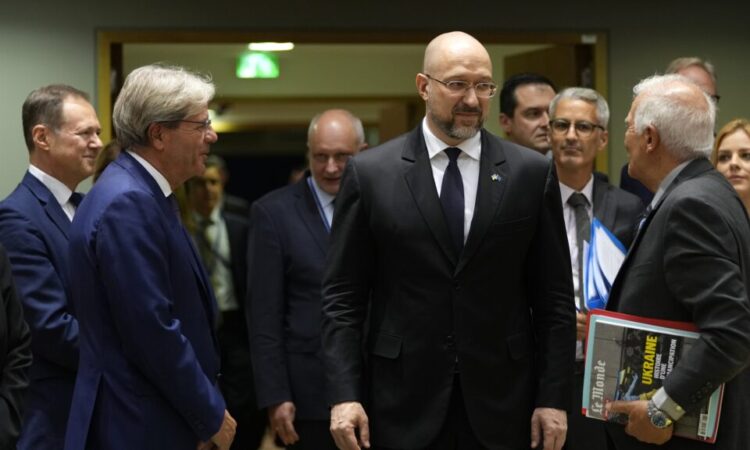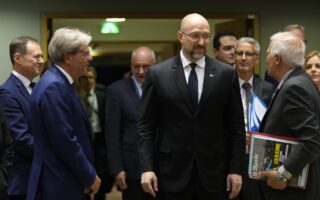

Ukrainian Prime Minister Denys Shmyhal (center), European Union foreign policy chief Josep Borrell (right) and European Commissioner for Economy Paolo Gentiloni (second left) speak as they arrive at the European Council, Brussels on September 5, 2022. [AP]
Changes come about in different ways. Gradually, over the long term. Or suddenly, with “events, dear boy, events,” whose proportions we sometimes define as “historic.” Or changes happen through the regular back and forth of real life, or by oscillations, sometimes in multi-decade cycles. Changes occur visibly or imperceptibly, sometimes going in opposite directions. Entering the new year 2023 offers an opportunity to take stock of the evolving shifts in Europe and its surroundings.
The war in Ukraine is causing layers to shift in opposite directions for Europe. The surface layers have moved toward strengthening Europe: swift EU reaction, rapid energy decoupling from Russia, copious financial and military aid to Ukraine, unity of Europe and the West in nine rounds of unprecedented sanctions, a decisive and principled stance by a rules-based democratic Europe against the brutality of an illegal invasion.
The deeper layers, however, are moving in exactly the opposite direction, weakening and dividing the European Union: a lasting conflict in its eastern neighborhood that the EU failed to prevent, a huge cost (including Ukraine’s reconstruction) waiting to be shouldered by Europe, intra-EU divisions that are only bound to intensify over future policy toward Russia, a shift of power toward the northeastern states of the EU and a weakening of the Franco-German core, the indispensable engine of European integration. The distance from Vilnius or Tallinn to Berlin and Paris is now glaringly greater than it is to Washington, DC (See “ELIAMEP Outlook: Predictions for 2023”).
The path is ironically similar with Europe’s great transatlantic partner. The surface layers are moving favorably for the United States: Putin’s Russia is in a war quagmire with no conceivably favorable end, its economic and military might inexorably weakening; the West is united under Biden’s leadership; the EU is leaving behind any talk of strategic autonomy in defense, fully aligned with NATO, which is gaining two new members; even US energy companies are making historically high windfall profits.
However, the deeper layers here are also moving in the opposite direction: The sanctions are delivering Russia as a junior partner into the arms of China, an alignment US diplomacy spent most of the postwar era seeking to avert; sanctions are bringing closer together authoritarian regimes and middle powers (BRICS+) that find common ground in accusing the West of hypocrisy and disruption of global trade at the expense of the developing world. The BRICS and more are now seeking to buy insurance by reducing their dependency on the West, opening the way for China to expand its own influence. Some of these countries have rushed to affirm their strategic autonomy, even if they remain formally allied with the West.
Erdogan’s Turkey is taking advantage of its geopolitical upgrade due to the Ukraine war to provocatively deviate from NATO on a range of issues. Saudi Arabia in October lowered oil supply, raising prices in defiance of US President Biden, and in December hosted PRC President Xi Jinping, as a prelude to closer energy cooperation between China and the Gulf states. Western sanctions are moving the BRICS away from the US dollar; their oil trades are switching to Chinese currency (the “petroyuan” replacing the “petrodollar”).
We are moving from a dysfunctional international system to a more anarchic, Hobbesian global setting, governed by great power competition, in the context of emaciated global institutions
China is already the largest investor in Iran too, where the momentum for a resuscitation of the JCPOA nuclear deal (foolishly destroyed by the Trump administration) has been terminally lost following Russia’s invasion of Ukraine. The decline in the global share of the US dollar as reserve currency is undercutting US power – and it doesn’t look like the euro is filling some of the gap. Is this fragmentation to the longer-term benefit of the West? I very much doubt it.
Is the erosion of globalization (which had ensured three decades of low inflation, even at the cost of higher income inequalities – where, however, government fiscal choices were to blame) really in the best interest of the US? Is the emergence of a cold war with China (even if that unites America in a bipartisan way) in the West’s (or, even more so, in Europe’s) best interest? Cold wars have a nasty tendency to raise the temperature when confrontation escalates toward self-fulfilling prophecies.
And the most visible shifts? We are moving from a dysfunctional international system to a more anarchic, Hobbesian global setting, governed by great power competition, in the context of emaciated global institutions. What is the use of the UN Security Council when a permanent member has waged a brutal invasion against another sovereign state? How can world trade function when the WTO’s appellate court remains defunct and protectionist policies are directly contravening the rules of free trade?
Finally, it is most likely that 2023 will unfold unfavorably for the global South: A strong dollar and rising interest rates are nurturing a debt crisis in the developing world and energy and food crises threatening social explosions in countries that are already exposed to civil conflict and climate change. If this translates into destabilization and new migration and refugee waves from the Mediterranean’s southern rim, Europe again will be the first to be exposed to the consequences.
This is not a promising outlook for Europe. Unless 2023 manages to positively surprise us.
George Pagoulatos is a professor of European politics and economy at the Athens University of Economics & Business and director general of the Hellenic Foundation for European & Foreign Policy (ELIAMEP).






